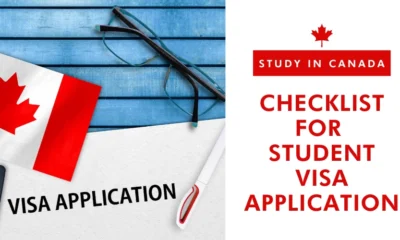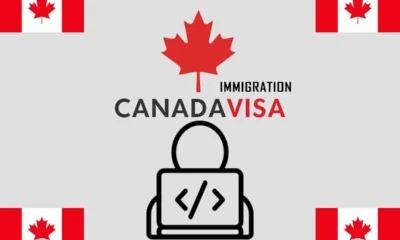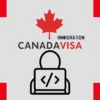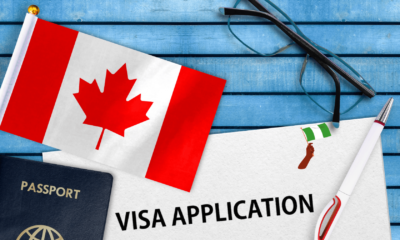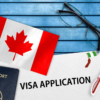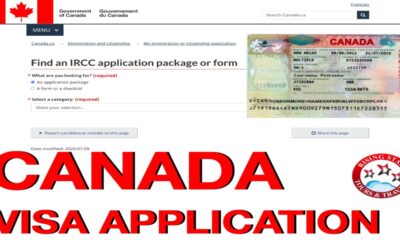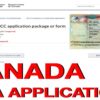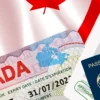Canada Immigration
How to Immigrate to Canada as a Teacher in 2023
Regardless of your country or where you are moving from, immigrating to Canada as a Teacher or any profession can be an extremely long and tiring process – especially with skilled and unskilled workers from many countries becoming increasingly interested in Canada this year 2023. However, depending on the motivation when applying for citizenship, some may have a slightly shorter waiting period than others.
Federal skilled workers (FSW) are of greater value to a country and are, therefore, of a higher priority, especially in recession-proof industries. For example, doctors, dentists, and teachers are professions that will always be necessary and needed. That is good news for those wanting to immigrate to Canada as a teacher.
Provincial and territorial governments operate their school systems and are responsible for setting out the regulations for teaching jobs in Canada. As a result, the rules are alike across the country but with some local differences.
Immigrate to Canada as a Teacher
The first step to immigrating to Canada as a teacher begins with a simple assessment; if you are ready to take your application, contact an immigration lawyer specializing in Canadian immigration. Most lawyers offer affordable or even free consultations to listen to your situation.
The lawyer will discuss the cost of his services when the consultation is positive. They will then explain exactly how much easier they can make the entire process for you.
Selection Factors for FSW and Approval for Teachers
- Highest level of education completed; higher than high school diploma preferred
- Work experience shows at least one full year of employment that falls into one of the following occupational categories: managerial, professional, or technical/skilled.
- Fluent in French and English (both spoken in Canada)
- The age you are currently
- Overall adaptability (usually tested through an assessment quiz)
- The current state of employment (or offer)
A bachelor’s degree in education and a provincial certificate are required for teaching jobs in Canada. It is highly recommended that you start before arriving in Canada if possible because obtaining certification can be slow.
Other factors are considered to assess eligibility for teaching jobs in Canada. Such includes:
- Most recent teaching experience.
- Familiarity with the culture and curriculum of the Canadian education system
- Fitness to teach, including character reference and successful criminal record checks.
Supervised student teaching may also be required. In Canada, one must major in one teachable subject and a minor in another to be eligible for secondary teaching jobs. These include business, sciences, languages, and social studies.
Current Restrictions
In July 2012, the CIC (Citizenship and Immigration Canada) halted accepting applications for the FSW program. It is noted that applications will likely be accepted once again when the program’s updated criteria take effect.
However, this halt does not affect applicants who:
- Have a current employment offer (already arranged in Canada) or
- You must be internationally enrolled or were enrolled within the last year in a Canadian Ph.D. program.
Cost of Living Proof
Since Canada is not in the habit of allowing anyone to sleep on their streets, they will want to know how you plan to begin your life once you have crossed the border. Of course, any dependents you have will also be considered.
Having too much money without a paper trail is a quick way to get your application dismissed, while lacking enough funds to sustain your family for more than a month will typically end the same way.
Automatic Dismissal
Certain applicants will most likely be denied immediately, so ensure none of these discrepancies get in your way before moving forward.
- Possession of a human/international rights violation
- A criminal history
- DUI convictions, whether because of alcohol or drugs, will most likely get you turned down
- Ties or past links to organized crime
- Showing certain, especially contagious, health conditions
- Lack of proof of or not enough financial security
- Discrepancies in your applications
- Anyone that goes against Canada’s Immigration and Refugee Protection Act, or IRPA
- Anyone found to be concerning an inadmissible person
How much are teachers paid in Canada
Teaching is a noble profession and one of the essential services for the growth and development of society. Whether you are a primary school teacher, a high school teacher, or a college professor, your services are needed to develop your students who depend on you for their life.
No wonder Canada places education so high in her value system and offers free education to her citizens and permanent residents, including their family members.
Hence, as a teacher in Canada, you are entitled to a considerable salary for your services. According to Business Insider, Canada is among the best ten countries on the list of best-paid elementary teaching jobs in 2019.
Below are some teachers’ average salaries in Canada according to provinces and territories.
Average Annual Salaries for High School Teachers in Canada (Province/Territory Average Salary (CAD) – National Average $68,894);
- Alberta $70,098
- British Columbia $53,031
- New Brunswick $66,250
- Newfoundland & Labrador $58,500
- Northwest Territories $82,000
- Nova Scotia $57,675
- Ontario $87,000
- Prince Edward Island $63,512
- Quebec $49,579
- Saskatchewan $62,400
- Yukon $69,000
Benefits Teachers Gain in Canada
Teachers in Canada have access to many benefits, including foreign teachers. One benefit is the universal healthcare system, which won’t cost you anything. It also includes the employment benefits, which are;
Benefit Description
1. Paid maternity and parental benefits Maternity benefits (up to 55% of your earnings for up to 15 weeks) + standard or extended parental benefits
- standard – up to 55% of your earnings for up to 40 weeks (1 parent can’t take more than 35 weeks)
- or extended – up to 33% of your earnings for up to 69 weeks (1 parent can’t take more than 61 weeks)
2. Sickness benefits Up to 55% of your earnings for up to 15 weeks if you can’t find work for medical reasons.
3. Caregiver Benefits Family caregiver benefit for children – up to 35 weeks payable (a critically ill or injured person under 18)
4. Family caregiver benefits for adults – up to 15 weeks (a critically ill or injured person 18 or older)
5. Compassionate care benefits – up to 26 weeks ( a person of any age who needs end-of-life-care)
These benefits may vary from province to province and whether you work as a full-time or part-time teacher.
Which provinces are in high demand for teachers
Before considering the province where you can immigrate to Canada as a teacher, it’s vital that you know which territories need more teachers, as this will help you in your decision.
The table below shows that provinces are in high demand for teachers, ‘Canadian Provinces/Territories Where Teachers Are In-demand’.
Province/Territory Occupation In-demand;
- Alberta (4011) University professors and lecturers
- British Columbia (4413) Elementary and secondary school teacher assistants
- Newfoundland & Labrador (4011) University professors and lecturers
- (4031) Secondary school teachers
- Nova Scotia (4021) College and vocational instructors
- Northwest Territories (4214) Early Childhood Educator
- Prince Edward Island (4011) University professors and lecturers
- Saskatchewan (4011) University professors and lecturers
- (4021) College and vocational instructors
- (4214) Early Childhood Educator
- (4215) Instructor of persons with disabilities
- (4216) Other instructors
- (4413) Elementary and secondary school teacher assistants
- Yukon (4214) Early Childhood Educator
Necessary Documents
Before you immigrate to Canada as a teacher, you must present the required documents, especially your academic documents, which must be up to Canadian standards. If you studied outside Canada and your documents meet Canadian standards, then you must obtain Educational Credential Assessment proving so.
Below is a list of organizations that can help you run the documents you require to migrate to Canada as a teacher;
- Comparative Education Service – University of Toronto School of Continuing Studies;
- International Credential Assessment Service of Canada;
- World Education Services;
- International Qualifications Assessment Service (IQAS); and
- International Credential Evaluation Service.
The job you can apply for also depends on your academic qualifications, affecting the documents you require to migrate to Canada. Below is a list of educational requirements:
- Childhood educators require a 2 – 4 year college program in early childhood education or a Bachelor’s Degree in child development.
- Elementary and Kindergarten teachers require a Bachelor’s Degree in education and possibly child development.
- Academic or secondary teachers usually require a Bachelor’s in Education and the Arts or Sciences.
- College and Vocational Instructors require a Bachelor’s or Master’s Degree or College Diploma in your field of expertise and possibly a qualification in adult education (certificate, diploma, or degree)
- University professors need a Doctoral and Master’s Degree in their specialized field.
You will also be given a provincial teaching certificate and license by the province where you work, and you have become a member of the teacher’s association in that province.
Below is a list of regulatory bodies that can issue licenses to you to work as a teacher in Canada.
Regulatory Bodies for Teachers in Canada
Province/Territory Regulatory Authority
- Alberta Alberta Education, Professional Standard
- British Columbia Ministry of Education, Teacher Regulation Branch
- Manitoba Department of Education and Literacy, Teacher Certification Unit
- New Brunswick Department of Education, Teacher Certification Unit
- Newfoundland and Labrador Department of Education, Registrar of Teacher Certification
- Northwest Territory Department Education, Culture and Employment, Teacher Certification
- Nova Scotia Department of Education, Registrar of Teacher Certification
- Nunavut Educators’ Certification, Department of Education
- Ontario College of Teachers Ontario College of Teachers
- Prince Edward Island Department of Education and Childhood Development, Registrar’s Office Department of Education and Childhood Development, Registrar’s Office
- Québec Québec – Ministère de l’Éducation, due Loisir et du Sport, de LA formation et de LA titularisation due personnel scolaire
- Saskatchewan Department of Education, Teacher Services
- Yukon Education Teacher Certification Unit
Job Offer and Job Opportunity
As someone who wants to immigrate to Canada as a teacher to live and work, you can qualify for some immigration programs as a skilled worker, like the express system. Still, some skilled workers sometimes find it difficult to secure jobs in Canada. So, sometimes it is better to secure a job offer before migrating to Canada for two reasons.
- The first reason is that it will reduce the stress of looking for a job and settling down. So, if you already have a genuine job offer, you will have more time to do other things.
- Secondly, it can boost your Permanent Residence score, making it easier for you. You can score up to 10 points in your Comprehensive Ranking System and be nominated for the provincial program.
Choose an Immigration Program
There are plenty of immigration programs that you can use to migrate to Canada as a teacher. So, you must choose the correct one that suits your qualifications.
The best among them for you as a teacher are;
- Express Entry system
- Provincial Nominee Program;
- Atlantic Immigration Pilot;
- Rural and Northern Immigration Pilot.
Alternatively, you can teach online in Canada from any country you choose. Check out our topic on obtaining a work permit to teach in Canada.
Special Provincial Immigration programs for teachers
Some provinces have special immigration programs for teachers who want to teach in their province or territory. The programs are;
Province/Territory Immigration Stream/Category;
- Alberta Alberta Express Entry Stream
- British Columbia Express Entry: Skilled Worker Category
- Newfoundland and Labrador Express Entry: Skilled Worker Stream
- Northwest Territories Express Entry: Skilled Worker Stream
- Nova Scotia Nova Scotia Demand: Express Entry Stream
- Prince Edward Island Express Entry Stream
- Saskatchewan Express Entry: International Skilled Worker Category
- Yukon Express Entry: Skilled Worker Stream
FAQs
Are teachers skilled workers?
According to National Occupational Classifications, teachers are classified as skilled workers. So you can qualify for the Federal Skilled Worker program as a teacher.
Can I work online as a teacher in Canada?
Yes, working online as a teacher is possible. Online teaching only became more critical with the coronavirus pandemic. And with the technological advancement that Canada has attained, online teaching is allowed in Canada. This will enable teachers to work from anywhere in Canada.
However, you must meet the exact requirements and experience teachers who regularly teach in Canadian classrooms need to qualify.




